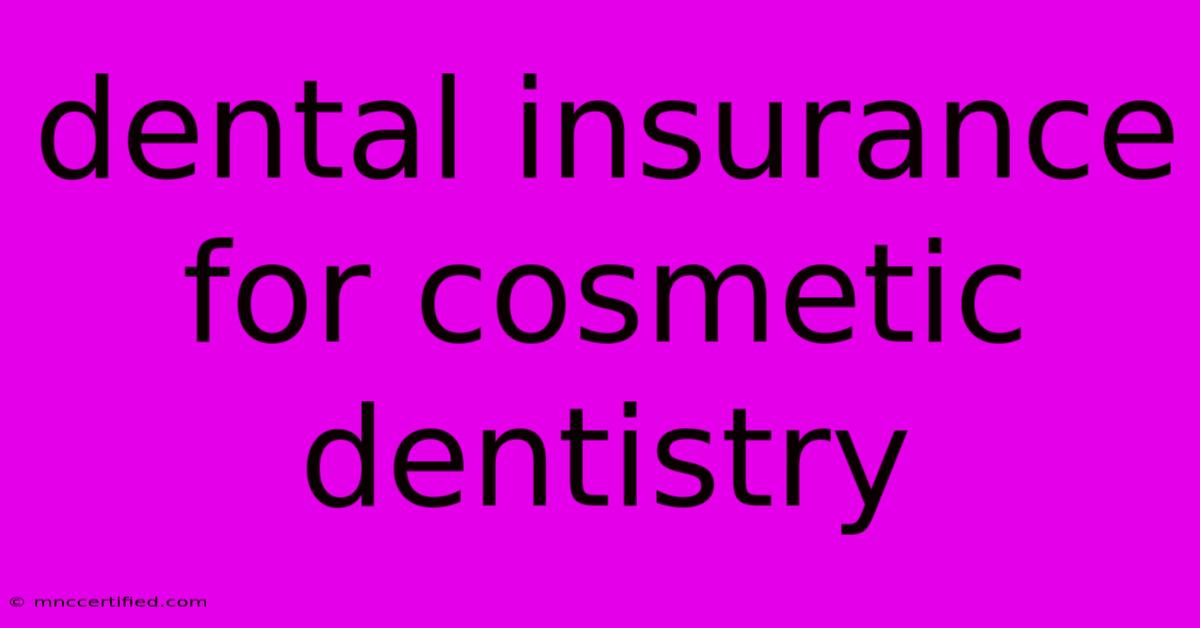Dental Insurance For Cosmetic Dentistry

Table of Contents
Does Dental Insurance Cover Cosmetic Dentistry? A Comprehensive Guide
Smiling confidently is a powerful feeling, and cosmetic dentistry can help you achieve that. But when considering treatments like teeth whitening or veneers, a common question arises: Does dental insurance cover cosmetic procedures?
The answer, unfortunately, is not a straightforward yes or no. It depends on several factors, including your specific insurance plan, the type of cosmetic procedure you desire, and the reason behind it. Let's break it down.
Understanding the Difference: Cosmetic vs. Necessary Dental Care
To grasp the coverage nuances, it's vital to distinguish between cosmetic dentistry and necessary dental care.
- Cosmetic dentistry focuses on enhancing the aesthetics of your smile, addressing concerns like discolored teeth, chipped or cracked teeth, gaps, or uneven alignment. These procedures are typically considered elective and are often not covered by insurance.
- Necessary dental care is about maintaining oral health and preventing further complications. This includes procedures like fillings, root canals, extractions, and gum disease treatment, which are generally covered by insurance plans.
When Cosmetic Procedures Might Be Covered
While most insurance plans don't cover cosmetic procedures outright, there are instances where some coverage might be available:
- Medical necessity: If a cosmetic procedure is deemed medically necessary to address a health issue, such as a misaligned bite causing pain or difficulty chewing, your insurance might partially cover it. For example, if a chipped tooth is causing pain and requires a veneer for repair, the insurance may cover the portion deemed "restorative."
- Dental accidents: In case of a chipped tooth, a cracked tooth, or a tooth fracture resulting from an accident, your insurance might cover the repair or replacement even if it involves a cosmetic procedure.
- Dental implants: Some insurance plans offer limited coverage for dental implants, especially if they're used to replace missing teeth that are affecting your overall oral health.
Factors Affecting Coverage
Several factors influence whether your insurance covers cosmetic procedures:
- Your insurance plan: Dental insurance plans vary greatly in terms of coverage. Some plans may offer limited coverage for specific cosmetic procedures, while others might not cover anything beyond necessary dental care.
- The type of cosmetic procedure: Common cosmetic procedures like teeth whitening, veneers, and dental bonding typically aren't covered. However, your plan might offer coverage for certain types of procedures like dental implants, braces, or Invisalign, especially if deemed medically necessary.
- Your deductible and co-pay: Even if your insurance covers a portion of a cosmetic procedure, you'll likely have to meet a deductible and pay a co-pay before coverage kicks in.
Tips for Navigating Coverage
Here are some tips for understanding your dental insurance coverage for cosmetic procedures:
- Review your plan details: Carefully read through your insurance plan documents to understand your coverage limits for cosmetic procedures and any exclusions.
- Consult your dentist: Discuss your desired cosmetic procedures with your dentist. They can help you understand the potential costs, determine whether the procedure is medically necessary, and advise you on how to maximize your coverage.
- Explore financing options: If your insurance doesn't cover the entire cost, explore financing options like dental loans or payment plans to make the procedure more affordable.
Conclusion
Whether or not your dental insurance covers cosmetic procedures depends on several factors. While most insurance plans don't cover cosmetic procedures, there might be instances where coverage is available, especially if the procedure is medically necessary. Carefully review your insurance plan documents, consult with your dentist, and explore financing options to make your dream smile a reality.

Thank you for visiting our website wich cover about Dental Insurance For Cosmetic Dentistry. We hope the information provided has been useful to you. Feel free to contact us if you have any questions or need further assistance. See you next time and dont miss to bookmark.
Featured Posts
-
Outer Banks Season 4 Ending Is Sarah Alive
Nov 08, 2024
-
Temporary Car Insurance Washington State
Nov 08, 2024
-
How Much Does Drivers Ed Lower Insurance
Nov 08, 2024
-
Multiple Of Income Method Life Insurance
Nov 08, 2024
-
Conference League Goals Felix Christopher Top Scorers
Nov 08, 2024